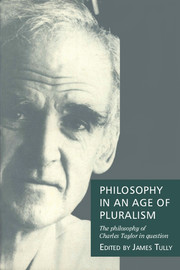Book contents
- Frontmatter
- Contents
- Notes on the contributors
- Preface
- Acknowledgements
- Introduction
- Part I Foundations
- 1 Internal and external in the work of Descartes
- 2 Taylor on truth
- Part II Interpreting modernity
- Part III Natural and human sciences
- Part IV Philosophy in practice
- Part V Ethics, politics and pluralism
- Part VI Reply and re-articulation
- Bibliography of the works of Charles Taylor
- Index
1 - Internal and external in the work of Descartes
Published online by Cambridge University Press: 05 June 2012
- Frontmatter
- Contents
- Notes on the contributors
- Preface
- Acknowledgements
- Introduction
- Part I Foundations
- 1 Internal and external in the work of Descartes
- 2 Taylor on truth
- Part II Interpreting modernity
- Part III Natural and human sciences
- Part IV Philosophy in practice
- Part V Ethics, politics and pluralism
- Part VI Reply and re-articulation
- Bibliography of the works of Charles Taylor
- Index
Summary
Sources of the self tells a story of unfulfilled promises and temporary resolutions and ends with an unsatisfied yearning for moral authority which is sometimes nostalgic, sometimes utopian. The sense of loss which permeates Charles Taylor's book is itself interwoven with one of its central organising themes, the movement he identifies within the Western philosophical tradition from a belief in an external guarantor of moral values to a confident reliance on the internal guarantee of reason – to what? Our inability to complete this dialectic, to avoid either simply reiterating its earlier moments or subsiding into a helpless relativism, is a failure which consigns us, in Taylor's view, to the angst and bewilderment of modernity. We cannot draw comfort from the idea of an external source of value, independent of us and yet binding; nor can we look inwards to our rationality as the source of incontrovertible moral truths. Unanchored, our moral values and commitments are merely ours, the ones we happen to cleave to, and the absence of a deeper justification for them breeds an apt and profound disquiet.
The stages of this unfinished story are represented in Sources of the self by three key figures: Plato, Descartes and ‘us’. To focus on them alone is to simplify Taylor's historical argument, which reveals in its detail both the complexity and the chronological unsteadiness of the process he aims to trace.
- Type
- Chapter
- Information
- Philosophy in an Age of PluralismThe Philosophy of Charles Taylor in Question, pp. 7 - 19Publisher: Cambridge University PressPrint publication year: 1994
- 18
- Cited by

